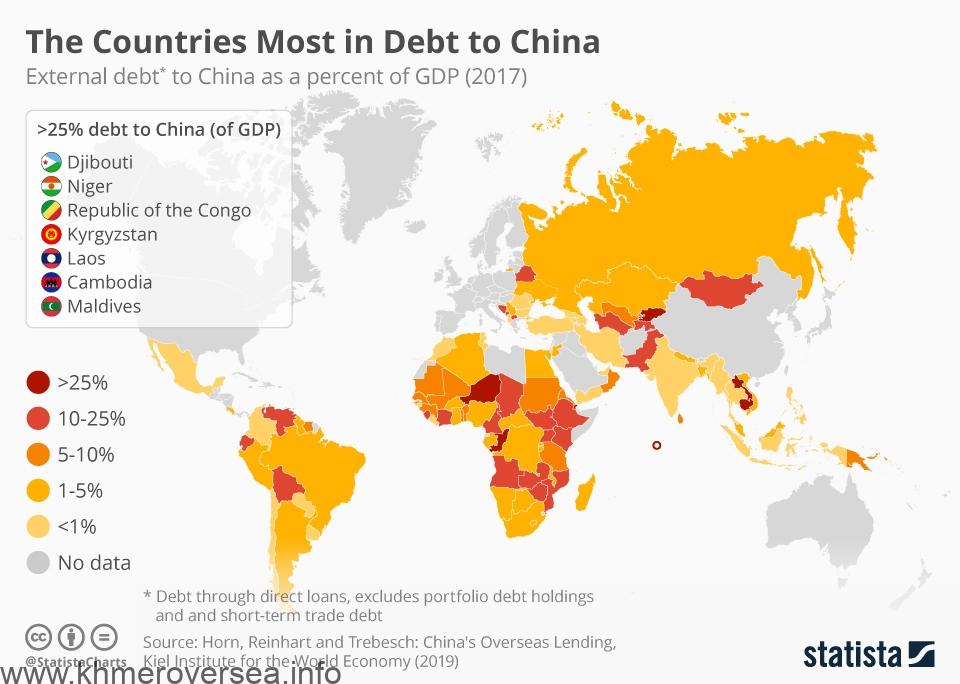Cambodia’s Hun Sen: ‘If I don’t rely on China, who will I rely on?’
Cambodia’s Hun Sen: ‘If I don’t rely on China, who will I rely on?’
PM calls criticism of close Beijing ties ‘unjust’ at Nikkei forum
For your original reference: Nikkei Asia

[ក្នុងចំឡើយដែលលោកហ៊ុន-សែនឆ្លើយថាបើមិនពឹងចិន តើលោកត្រូវទៅពឹងនរណា? គឺជាចំឡើយដែលខ្វះវិចារណញាណក្នុងនាមជាមេដឹកនាំប្រទេសដែលប្រកបដោយទំនួលខុសត្រូវនិងការបដិបត្តិតាមរដ្ឋធម្មនុញ្ញរបស់កម្ពុជា៖ ១. រដ្ឋធម្មនុញ្ញជំរុញអោយប្រជាពលរដ្ឋគ្រប់រូបមានន័យថាទាំងថ្នាក់ដឹកនាំនិងមន្ត្រីរាជការត្រូវមានឯករាជ្យភាពម្ចាស់ការ ការពារនូវសេចក្តីថ្លៃថ្នូរនិងអធិបតីបូរណភាពទឹកដីរបស់ខ្លួន ដោយពង្រឹងស្ថាប័នជាតិអោយរឹងបុឹងនិងមានការជឿទុកចិត្តពីប្រជាពលរដ្ឋ និងពង្រឹងសក្កតានុពលសេដ្ឋកិច្ចចេញពីក្នុងទៅវិញ(economic-internal growth, not externalities)។ ២. ចិនមិនមែនជាប្រទេសផ្តល់ជំនួយជាក់លាក់ទេ ជាប្រទេសបណ្តាក់ទុនរកស៊ីនៅកម្ពុជាព្រោះប្រទេសនេះជាប្រទេសសេដ្ឋកិច្ចនាំចេញ(export-led growth)ដូចកម្ពុជាដែរ ឬអាចនិយាយបានថាជាដៃគូប្រកួតប្រជែងទីផ្សាជាមួយកម្ពុជា ដែលខុសពីសហគមអុឺរ៉ុប ជប៉ុន និងសហរដ្ឋអាមេរិកជាដើម។ ៣. បំណុលដែលកម្ពុជាជំពាក់បរទេសប្រហែលជាង៨,៨កោដិលានដុល្លា ក្នុងនោះជំពាក់ចិនច្រើនជាងគេគឺជិត៥០ភាគរយ ដែលអាចធ្វើអោយប្រទេសក្រីក្រមួយនេះជាប់អន្ទាក់បំណុល(debts trap)ជាមួយចិនដូចស្រីលង្កា លាវ និងអាហ្រ្វិកា។ បន្ថែមពីលើនេះ ជំនួយចិនគ្មានតម្លាភាពនិងអំណោយផលដល់ប្រជាជនថ្នាក់ក្រោមទេ គឺរមែងជួយបន្ថែមអំណាចផ្តាច់ការអោយកាន់តែផ្តាច់ឡើងថែមទៀតប៉ុណ្ណោះ។]

Cambodian Prime Minister Hun Sen speaks during the 26th International Conference on The Future of Asia on May 20. (Photo by Kai Fujii) Nikkei staff writers May 20, 2021 09:30 JST Updated on May 20, 2021 20:28 JST
TOKYO — Cambodia’s Prime Minister Hun Sen has defended his close relationship with China, pointing to Beijing’s large injections of financial support to his small nation.
China is Cambodia’s key political patron and largest source of development assistance, having helped funnel billions of dollars for infrastructure projects. This has fueled criticism that Phnom Penh has become over-reliant on, and a proxy for, Beijing. But Hun Sen, speaking remotely to Nikkei’s Future of Asia conference on Thursday, called that criticism “unjust.”
“If I don’t rely on China, who will I rely on? If I don’t ask China, who am I to ask?” Hun Sen said to the forum, held in Tokyo and online through Friday.
There have also been suggestions that Cambodia intends to host Chinese military assets at bases on its soil. Hun Sen reiterated previous denials that there were plans to do so at a naval base where the Chinese government is helping to expand facilities.
He pointed to Cambodia’s constitution, which prohibits foreign military bases within the country. He added that any country was welcome to send ships to Cambodia, a sentiment he echoed regarding development aid.
“We do not close the door to anyone in accepting assistance for building the country,” he said.
Hun Sen remained defiant about European Union trade sanctions imposed on the country last August.
Brussels partially suspended preferential access to the EU bloc for 20% of Cambodia’s exports, over what it called systemic human rights violations. The move was a blow for the country’s $10 billion garment manufacturing sector, which relies on the European market.
Among the EU concerns was the forced dissolution of Cambodia’s main opposition party, the Cambodian National Rescue Party, which came close to winning a national election in 2013. Since the party’s dissolution in 2017, its leader has been charged with treason and senior members have fled abroad to avoid jail. More than 100 supporters have been hauled before courts in mass trials.
Hun Sen said the EU assessment “did not conform with reality” and claimed the existence of more than 20 small political parties was proof that Cambodia remained democratic. In almost the same breath, however, he noted some opponents must be “rehabilitated” in order to participate in politics.
He was dismissive of the impact of the EU’s preference withdrawal, saying it had been eclipsed by the “huge” economic fallout of the pandemic. Cambodia would not seek to overturn the decision, he added.
“We continue to export 20% of our goods to Europe by paying tariffs to them,” he said.
“But we cannot accept that our country cannot implement its own laws. An independent sovereign state has to implement its laws.”
With Cambodia battling an aggressive coronavirus outbreak, he also touched on the need to make COVID-19 vaccines easily available and eliminate restrictions on the movement of medical goods and services across borders.
“Asia needs to attach high priority and utmost importance to ensuring that the COVID-19 vaccines and medications are global public goods, which will be supplied and distributed upon humanitarian cause to every country, particularly the vulnerable ones,” he said.
Cambodia, which recorded fewer than 500 cases and no virus-linked deaths in 2020, is grappling with its worst coronavirus outbreak since the pandemic began, recording more than 20,000 infections since February. Its health authorities are rushing to roll out a vaccine campaign and have delivered at least one shot to more than 2 million citizens.
While the country received some AstraZeneca stocks via the United Nations-backed COVAX program, the bulk of its vaccine supplies are from China, something Hun Sen emphasized.
“Without assistance from China,” he said, “maybe we will not have vaccines for our people.”
Reporting by Shaun Turton.
Read on for a full run-down of the first day’s speeches and discussions.
